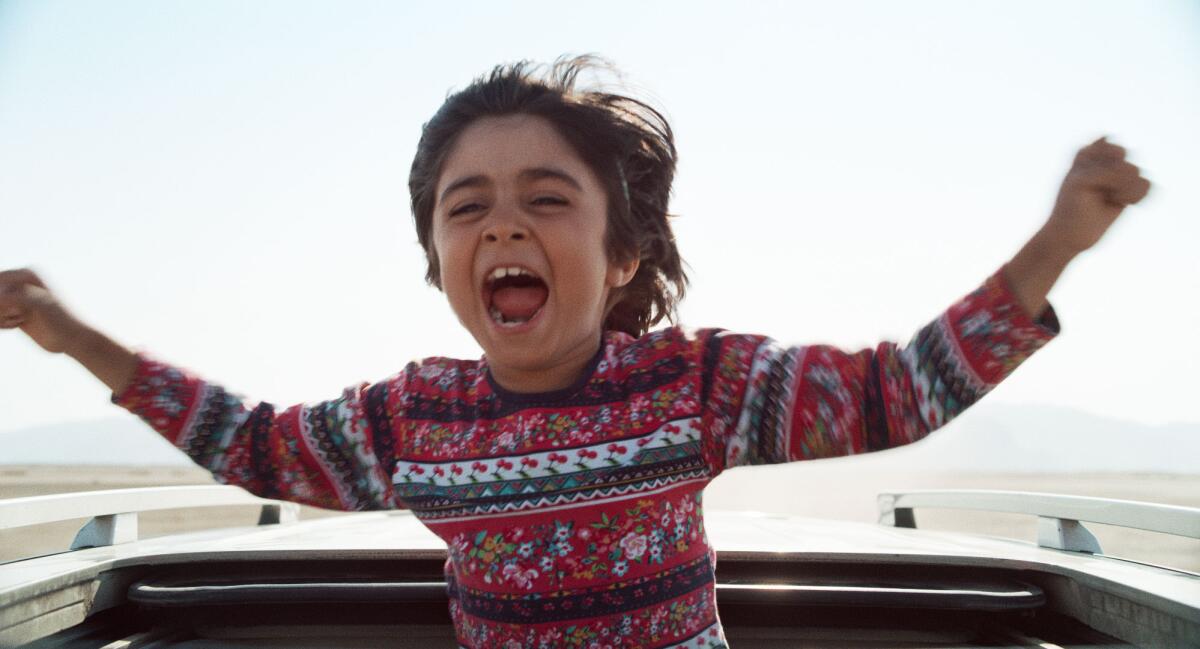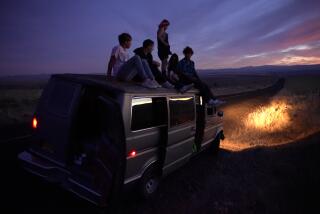Review: An Iranian filmmaking scion charts his own path with whimsical ‘Hit the Road’

- Share via
Iranian cinema in all its poetic humanity is on lovely display in Panah Panahi’s “Hit the Road,” a charmingly offbeat, meaningful journey across remote spaces (and at one point, fantastically, into space itself) that follows a tight-knit Tehran family of four entering unfamiliar territory.
It’s tempting to consider Panahi’s feature debut in some hereditary through line with the pointedly sociopolitical, realist work of his father, state-targeted filmmaker Jafar Panahi (“Offside,” “3 Faces”), who is still under a 20-year ban from filmmaking inside Iran. But that inkling is appealingly thwarted at every turn by how assured the whimsical, heartfelt “Hit the Road” is in mapping its own artistic path of humor and sorrow, images and sound, and keenly observed detail mixed with the unexplained.
For your safety
The Times is committed to reviewing theatrical film releases during the COVID-19 pandemic. Because moviegoing carries risks during this time, we remind readers to follow health and safety guidelines as outlined by the CDC and local health officials.
The opening scene, starting with a shot from inside the family’s mini-SUV on the side of a lonely highway, is one such subtle signal of Panahi’s conscious independence from expected comparisons. The parents doze in their seats. In the back seat, their younger boy (Rayan Sarlak) pretend-plays on drawn piano keys that decorate the leg cast of his dad (Hassan Madjooni), his fingering matching the Schubert sonata we hear. The older son (Amin Simiar) is outside, wandering the perimeter of the car, stopping to look in forlornly at his mother (Pantea Panahiha). He then turns to gaze at the horizon — what lies ahead?
The quiet is interrupted by the awakened mom’s fear that their little one has, contrary to her wishes, smuggled a cellphone on the trip. The boy’s impish defiance, coupled with the weary father’s wry handling of it, kick-starts the movie’s delightful strain of rambunctious-kid comedy. But the driving son’s generally tense demeanor and the mother’s anxious and sentimental preoccupations — no phones, suspicious cars, family mementos, lip-synching to beloved pre-revolution pop songs — indicate this is no ordinary trip for these unnamed characters.
Eventually it’s made clear that they’re headed to the border, where the older brother is to be spirited out of Iran illegally. This fraught mission — one that must cross the mind of everyone suffering under Iran’s brand of authoritarian rule — is less an engine of typical narrative suspense, however, and more a dramatic construct so Panahi can paint a picture of family dynamics when colored by the most heartbreaking kind of urgent togetherness.
What transpires is an exquisitely controlled yet diverting blend of pre-mourning and in-the-moment pleasures, a tonal blend of miraculous balance for a first-time filmmaker, even one with Panahi’s one-of-a-kind training. (He also apprenticed with Iranian auteur Abbas Kiarostami.) And as the landscape changes from dry, dusty flatness to mist-covered mountain passes, Panahi’s depth-conscious framing of his characters against nature and Amin Jafari’s crisp, dreamlike cinematography shift the atmosphere further, to something almost otherworldly. In one aforementioned instance, Panahi leaves earth entirely (with the help of some gently applied visual effects), and yet you grasp immediately how and why he’s earned this sweet, somber drift from reality.
The performances are uniformly perfect, too, from mini-maestro of puckishness Sarlak (what a child actor!) to the magnetic swirl of maternal strength and vulnerability that is Panahiha, who has one poignant moment to herself so delicate you can practically feel the breeze that draws a smile. The men, meanwhile, do their best to present a stern front, but in a comically halting exchange between Madjooni’s gruff, wisdom-imparting dad and Simiar’s apprehensive firstborn, against an impossibly scenic backdrop, the awkwardness is touching.
“Who is the traveler?” barks one of the intimidating, sheepskin-hooded motorcyclists facilitating this family’s expensive, emotional act of sacrifice and love for their grown son. What “Hit the Road” helps us realize is that they all are, of course, and to be a passenger alongside these nervous voyagers, as they clash, tease and cherish each other on the way to this strange and terrible fork in their lives, is to be a very fortunate moviegoer indeed.
'Hit the Road'
In Persian with English subtitles
Not rated
Running time: 1 hour, 33 minutes
Playing: Starts May 6, Laemmle Royal, West Los Angeles; Laemmle Town Center 5, Encino
More to Read
Only good movies
Get the Indie Focus newsletter, Mark Olsen's weekly guide to the world of cinema.
You may occasionally receive promotional content from the Los Angeles Times.










